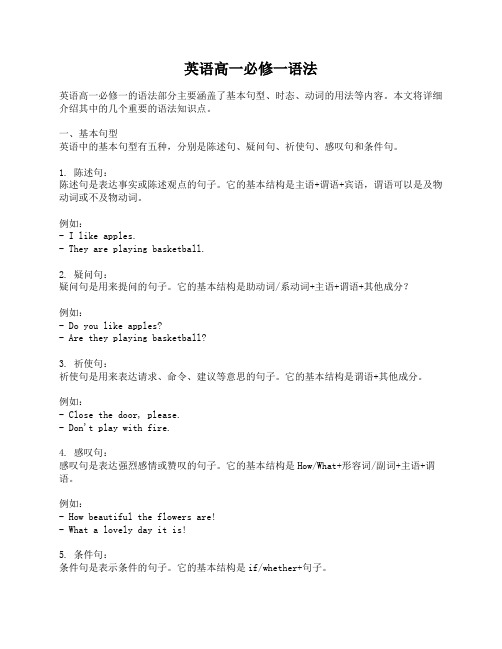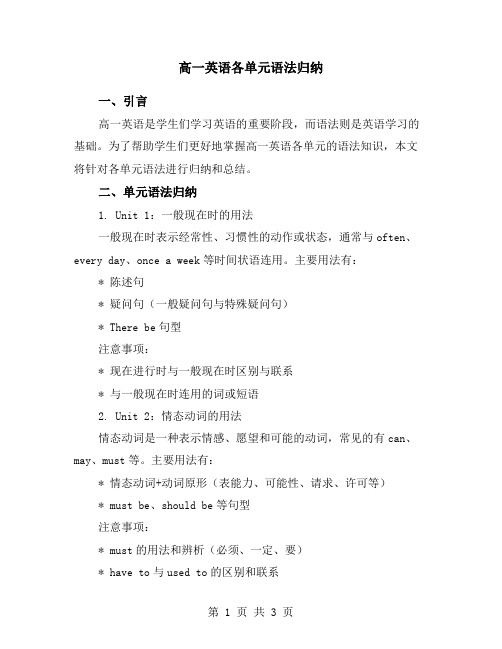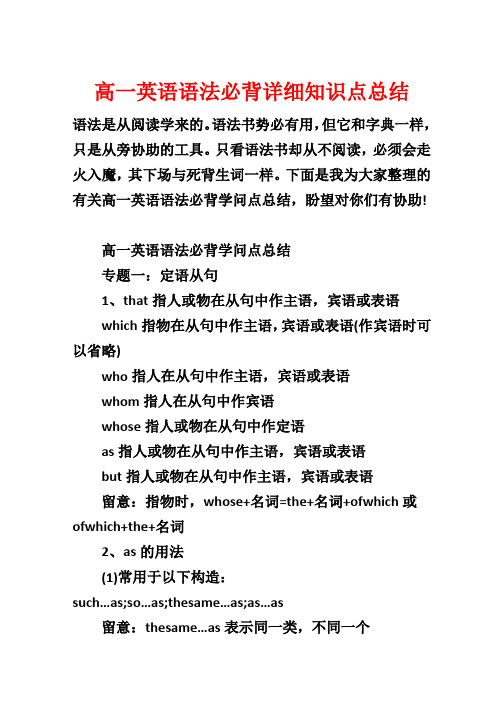高一英语语法知识讲解
高一英语必修一语法知识总结

高一英语必修一语法知识总结不要觉得英语很难,它不难,只要认真去学,肯定能学好。
今天小编在这给大家整理了高一英语必修一语法知识总结,接下来随着小编一起来看看吧!高一英语必修一语法知识总结一般现在时、现在进行时、-ing形容词和-ed形容词的用法考点1:一般现在时的用法1.表示经常性、习惯性的动作。
句中常出现often, usually, sometimes, always, every day等状语。
He goes to school at seven o'clock every day. 他每天七点去上学。
She always takes a walk in the evening. 她常在晚间散步。
We always care about and help each other. 我们总是互相关心、互相帮助。
2.表示普遍的真理、科学事实,也用在格言中。
Light travels faster than sound. 光比声音传播得快。
Actions speak louder than words. 行动比言语更为响亮。
3.在时间状语从句和条件状语从句中,通常用一般现在时代替一般将来时。
When I graduate, I'll go back to the countryside. 我毕业后将回农村。
They won't come to see us if it rains next Sunday. 如果下周日下雨,他们就不会来看我们了。
4.表示按规定或时刻表将要发生的动作,仅限于少数动词,如begin, leave, go, arrive, start等。
The meeting begins at eight. 会议八点开始。
The train starts at nine in the morning. 火车早上九点出发。
5.表示主语的特征、性格或说话时的感觉、状态。
英语高一必修一语法

英语高一必修一语法英语高一必修一的语法部分主要涵盖了基本句型、时态、动词的用法等内容。
本文将详细介绍其中的几个重要的语法知识点。
一、基本句型英语中的基本句型有五种,分别是陈述句、疑问句、祈使句、感叹句和条件句。
1. 陈述句:陈述句是表达事实或陈述观点的句子。
它的基本结构是主语+谓语+宾语,谓语可以是及物动词或不及物动词。
例如:- I like apples.- They are playing basketball.2. 疑问句:疑问句是用来提问的句子。
它的基本结构是助动词/系动词+主语+谓语+其他成分?例如:- Do you like apples?- Are they playing basketball?3. 祈使句:祈使句是用来表达请求、命令、建议等意思的句子。
它的基本结构是谓语+其他成分。
例如:- Close the door, please.- Don't play with fire.4. 感叹句:感叹句是表达强烈感情或赞叹的句子。
它的基本结构是How/What+形容词/副词+主语+谓语。
例如:- How beautiful the flowers are!- What a lovely day it is!5. 条件句:条件句是表示条件的句子。
它的基本结构是if/whether+句子。
例如:- If it rains tomorrow, we will stay at home.- Whether she comes or not, I will go to the party.二、时态在英语中,时态用于表示动作发生的时间。
高一必修一中涵盖了一般现在时、一般过去时、一般将来时等几个基本时态。
1. 一般现在时:一般现在时用于表示经常性的动作、习惯、真理、科学事实等。
它的基本结构是主语+谓语。
例如:- She goes to school every day.- Water boils at 100 degrees Celsius.2. 一般过去时:一般过去时用于表示过去发生的动作或状态。
高一英语必考知识点全部

高一英语必考知识点全部英语学习对于高中生来说,是一项必修课程,也是重要的考试内容。
下面就是为大家总结的高一英语必考知识点。
一、语法知识点1. 动词时态与语态英语中有多种时态,例如一般现在时、一般过去时、现在进行时等。
了解各个时态的构成和用法,以及被动语态的形式与应用。
2. 从句结构与用法了解主从复合句的构成和关系,包括定语从句、名词性从句和状语从句等。
掌握从句引导词的用法和位置。
3. 并列连词与关联词熟悉常用的并列连词如and、but、or以及关联词如because、although等。
掌握它们的用法和连接不同句子成分的能力。
4. 句型转换与句子结构调整学会对句子进行转换和调整,如同义句转换、被动语态转换、间接引语转换等。
二、词汇知识点1. 常用词汇掌握常用的英语单词和短语,包括名词、动词、形容词和副词等。
积累词汇的同时,了解它们的词性和用法。
2. 同义词和反义词学会识别和运用同义词和反义词,提高语言的表达能力。
注意它们的用法和搭配。
3. 词组与固定搭配了解一些常见的词组、习语和固定搭配,并能正确运用于实际语境中。
三、阅读理解知识点1. 阅读技巧掌握阅读理解的技巧,包括略读、扫读和精读。
了解如何根据问题和选项进行有针对性的阅读。
2. 理解文章结构学会分析文章的结构,包括段落的顺序、主题句和支持句的关系等。
能够准确地找到文章的主旨和关键信息。
3. 掌握常见题型熟悉并掌握常见的阅读理解题型,如选择题、填空题、判断题和配对题等。
了解不同题型的解题思路和答题技巧。
四、写作技巧知识点1. 作文结构掌握作文的结构,包括引言、正文和结论。
确保文中的段落有机衔接,逻辑清晰。
2. 表达思想能够清晰地表达自己的思想和观点,运用适当的词汇和句子结构。
写作时要注意语法和拼写错误。
3. 文章连贯性写作时注意段落和句子之间的连贯性,使用适当的过渡词和连接词,使文章更易读懂,逻辑更清晰。
五、听力技巧知识点1. 听力细节在听力理解中,要注意捕捉细节信息,如数字、日期、时间等。
高一英语各单元语法归纳

高一英语各单元语法归纳一、引言高一英语是学生们学习英语的重要阶段,而语法则是英语学习的基础。
为了帮助学生们更好地掌握高一英语各单元的语法知识,本文将针对各单元语法进行归纳和总结。
二、单元语法归纳1. Unit 1:一般现在时的用法一般现在时表示经常性、习惯性的动作或状态,通常与often、every day、once a week等时间状语连用。
主要用法有:* 陈述句* 疑问句(一般疑问句与特殊疑问句)* There be句型注意事项:* 现在进行时与一般现在时区别与联系* 与一般现在时连用的词或短语2. Unit 2:情态动词的用法情态动词是一种表示情感、愿望和可能的动词,常见的有can、may、must等。
主要用法有:* 情态动词+动词原形(表能力、可能性、请求、许可等)* must be、should be等句型注意事项:* must的用法和辨析(必须、一定、要)* have to与used to的区别和联系3. Unit 3:被动语态的用法被动语态表示主语是动作的承受者,常用的有be done、get done等形式。
主要用法有:* 被动语态的结构(be done)和形式(be being done)* 与被动语态连用的动词类型(及物动词)* 主动语态变被动语态的步骤和注意事项4. Unit 4:定语从句的用法定语从句是在句子中起修饰或限制作用的关系词,常用的关系词有that、which、who等。
主要用法有:* 关系词的种类和用法(that、which、who等)* 关系词的省略和替代(关系代词省略和关系副词替代)* 定语从句与同位语从句的区别和联系注意事项:* 限制性和非限制性定语从句的区别和联系* 关系代词that与which的区别和适用范围5. Unit 5:虚拟语气用法虚拟语气用于表达某种非真实条件状语从句,常见的有wish、if only等。
主要用法有:* 虚拟语气的形式和用法(建议、要求、建议未实现等)* 与虚拟语气连用的从句类型(名词性从句、定语从句)和从句引导词类型。
高一英语语法知识点归纳总结

高一英语语法知识点归纳总结高一英语语法知识点总结高一英语语法知识点总结(一)1. 定义:用作表语的从句叫做表语从句。
2. 构成:关联词+简单句3. 引导表语从句的关联词的种类:(1) 从属连词that。
例如:The trouble is that I have lost his address. 麻烦是我把他的地址丢了。
(2) 从属连词whether, as, as if。
例如:He looked just as he had looked ten years before. 他看起来还与十年前一样。
The question is whether they will be able to help us. 问题是他们是否能帮我们。
注:从属连词if一般不用来引导表语从句,但as if却可引导表语从句,例如:All this was over twenty years ago, but its as if it was only yesterday. 这都是20多年前的事了,但宛如昨天一样。
能跟表语从句的谓语动词一般为系动词be, seem, look等。
例如: It looked as if it was going to rain. 看起来天要下雨了。
(3)连接代词:Who whom whose whatWhich whoever whatever whichever连接副词:Where when how why例如:The problem is who we can get to replace her. 问题是我们能找到谁去替换她呢。
The question is how he did it. 问题是他是如何做此事的。
That was what she did this morning on reaching the attic. 那就是她今晨上了阁楼干的。
注:1. 连词because可引导表语从句。
高一英语语法复习知识点

高一英语语法复习知识点一、名词性从句名词性从句用来作句子成分,可以充当主语、宾语、表语、同位语等。
常见的名词性从句有:宾语从句、主语从句、表语从句和同位语从句。
宾语从句:宾语从句作为主句的宾语,常引导动词后面的宾语。
例如:I know that he is coming.我知道他要来了。
主语从句:主语从句作为主句的主语,常出现在句首位置。
例如:What he said is true.他说的是真的。
表语从句:表语从句用来说明主语的特征、状态或性质,常用系动词连接。
例如:The fact is that he didn't come.事实是他没有来。
同位语从句:同位语从句用来解释或说明名词的内容,常跟在某些名词后面。
例如:The news that he won the championship excited everyone.关于他赢得冠军的消息让每个人兴奋。
二、形容词性从句形容词性从句用来修饰某个名词或代词,相当于形容词的作用。
常见的形容词性从句有:定语从句和插入语从句。
定语从句:定语从句用来修饰名词或代词,起限制或补充说明的作用。
通常由关系代词或关系副词引导。
例如:The book that I borrowed from the library is very interesting.我从图书馆借来的这本书非常有趣。
插入语从句:插入语从句用来对整个句子或其中一部分进行补充说明,常用逗号或括号隔开。
例如:She arrived late, which made the teacher angry.她迟到了,这让老师很生气。
三、副词性从句副词性从句用来起状语的作用,修饰动词、形容词或副词。
常见的副词性从句有:时间状语从句、地点状语从句、方式状语从句、条件状语从句、目的状语从句、原因状语从句和结果状语从句。
时间状语从句:时间状语从句用来表示动作发生的时间,常由时间连词引导。
例如:I will call you when I arrive at the airport.我到达机场时会给你打电话。
高一英语语法必背详细知识点总结

高一英语语法必背详细知识点总结语法是从阅读学来的。
语法书势必有用,但它和字典一样,只是从旁协助的工具。
只看语法书却从不阅读,必须会走火入魔,其下场与死背生词一样。
下面是我为大家整理的有关高一英语语法必背学问点总结,盼望对你们有协助!高一英语语法必背学问点总结专题一:定语从句1、that指人或物在从句中作主语,宾语或表语which指物在从句中作主语,宾语或表语(作宾语时可以省略)who指人在从句中作主语,宾语或表语whom指人在从句中作宾语whose指人或物在从句中作定语as指人或物在从句中作主语,宾语或表语but指人或物在从句中作主语,宾语或表语留意:指物时,whose+名词=the+名词+ofwhich或ofwhich+the+名词2、as的用法(1)常用于以下构造:such…as;so…as;thesame…as;as…as留意:thesame…as表示同一类,不同一个thesame…that表示同一个(2)as与which的区分a、位置不同as可放在主句后,主句前或主句中间;which只能放在主句后。
b、as起连接作用,表达说话人的观点、看法,并指出主句内容的依据或出处,意为“正如,正像”。
Which相当于并列句,可以用andthis来代替,意为“这一点,这件事’”。
留意:as常用于以下构造:asweknow/asisknowntoall,asweallcansee,ashasbeensaidbe fore/above,asmightbeexcepted,asisoftenthecase,一般不能用which代替as。
c、在从句中作主语时,which既可作系动词be的主语也可作实义动词的主语,而as只可作系动词be的主语。
二、只用that不用which的状况1、.先行词为all,much,everything,nothing,something,anything,nothing,n one,theone等不定代词时2、先行词被only,any,few,little,no,all,just,very,right等修饰时.3、领先行词是最高级或被形容词最高级修饰时。
高一英语语法知识点归纳五篇

高一英语语法知识点归纳五篇英语的时态语法学习很重要哦,时态语法的正确运用能加分不少。
下面就是给大家带来的高一英语语法总结,希望能帮助到大家!高一英语语法总结1各种时态的被动语态被动语态概述被动语态的概念:它是动词的一种形式,表示主语与谓语之间的执行或被执行关系。
主动语态表示主语是谓语动作的执行者,例如:They saw the little boy crying by the river. 被动语态表示主语是谓语动作的承受者,例如:The little boy was seen crying by the river.被动语态的构成被动语态的形式是由“助动词be+动词的过去分词”构成。
助动词be随着主语的人称、数、时态等的不同而变化。
几种常见时态的被动语态形式如下:1. 一般现在时am/is/are + 过去分词例如:Rice is planted in the south of China.2. 一般过去时was/were + 过去分词例如:These trees were planted the year before last.3. 一般将来时will/shall + be + 过去分词例如:A sports meeting will be held next week in our school.4. 现在进行时am/is/are + being + 过去分词例如:Your radio is being repaired now.5. 过去进行时was/were + being + 过去分词When he got there, the problem was being discussed.6. 现在完成时have/has + been + 过去分词His work has been finished.Has his work been finished? Yes, it has. / No, it hasn’t.7. 过去完成时had + been + 过去分词注意:1.除了be之外的其它系动词如get, stay等也可以和过去分词构成被动语态。
- 1、下载文档前请自行甄别文档内容的完整性,平台不提供额外的编辑、内容补充、找答案等附加服务。
- 2、"仅部分预览"的文档,不可在线预览部分如存在完整性等问题,可反馈申请退款(可完整预览的文档不适用该条件!)。
- 3、如文档侵犯您的权益,请联系客服反馈,我们会尽快为您处理(人工客服工作时间:9:00-18:30)。
高一英语语法-情态动词讲练一、情态动词表推测1. 肯定的推测一般用must, should, may(might)或could(不用can),其中,must的语气最强,译为“肯定”、“准是”、“想必是”;should的语气次之,译为“很可能”、“应该”,指按常理推测;may(might),could的语气最弱,译为“也许”、“可能”。
①Helen _______ go on the trip with us but she isn’t quite sure yet. (2005年安徽卷)A. shallB. mustC. mayD. can②—I’ve taken someone else’s green sweater by mistake.—It ___ Harry’s. He always wears green. (2005年广东卷)A. has to beB. will beC. mustn’t beD. could be③I have lost one of my gloves. I _______ it somewhere.(2005年北京春季卷)A. must dropB. must have droppedC. must be droppingD. must have been dropped④If I ____ plan to do anything I wanted to ,I’d like to go to Tibet and travel through as much of it as possible. (2005年湖北卷)A. wouldB. couldC. had toD. ought to2. 否定推测分为两种情况:1)语气不很肯定时,常用may not, might not或could not,译为“可能不”、“也许不”。
You might just as well tell the manufacturer that male customers ______ not like the design of the furniture. (2004年上海春季卷)A. mustB. shallC. mayD. need2)否定语气较强时,则用can’t,译为“根本不可能”、“想必不会”,表示惊异、怀疑的感情色彩。
①—Do you know where David is? I couldn’t find him anywhere.—Well. He ______ have gone far——his coat’s still here.(2005年湖北卷)A. shouldn’tB. mus tn’tC. can’tD. wouldn’t②—Isn’t that Ann’s husband over there?—No, it _______ be him I’m sure he doesn’t wear glasses. (2004年全国卷Ⅰ)A. can’tB. must notC. won’tD. may not3. 疑问句中的推测,往往用can或could。
Mr. Bush is on time for everything. How ______ it be that he was late for the opening ceremony?(2001年上海春季卷)A. canB. shouldC. mayD. must4. 对已发生事情的肯定推测常用“must, may, might等+完成式”;否定推测常用“can, could, may, might等+完成式”。
①I was on the highway when this car went past followed by a police car. They _______ at least 150 kilometers an hour.(2005年重庆卷)A. should have been doingB. must have been doingC. could have doneD. would have done②He _______ have completed his wor k; otherwise, he wouldn’t be enjoying himself by seaside. (2005年北京卷)A. shouldB. mustC. wouldn’tD. can’t③—Tom is never late for work. Why is be absent today?—Something ________ to him. (2005年江西卷)A. must happenB. should have happenedC. could have happenedD. must have happened④My sister met him at the Grand Theatre yesterday afternoon, so he_____ have attended your lecture.(2000年上海卷)A. couldn’tB. needn’tC. mustn’tD. shouldn’t二、“情态动词+完成式”1. “should(ought to)+完成式”表示本应该做某事而实际上没有做。
其否定式表示某种行为不该发生但却发生了。
①—I’ll tell Mary about her new job tomorrow.— You________ her last week. (2004年福建卷)A.ought to tell B.would have toldC.must tell D.should have told②Oh, I’m not feeling well in the stomach, I _____ so much fried chicken just now. (2002年上海春季卷)A. shouldn’t eatB. mustn’t have eatenC. shouldn’t have eatenD. mustn’t eat2. “could+完成式”表示本来能够做成某事的但结果没能做成,含有遗憾的意味。
He paid for a seat, when he ______ have entered free. (2005年山东卷)A. couldB. wouldC. mustD. need3. “needn’t+不定式的完成式”表示本来不必做某事而实际上做了某事。
例如:You needn’t have watered the flowers, for it is going to rain.你本不需要浇花的,因为天就要下雨了。
— Catherine, I have cleaned the room for you.— Thanks. You ______ it. I could manage it myself. (2005年福建卷)A. needn’t doB. needn’t have doneC. mustn’t doD. shouldn’t have done三、常见的情态动词1. shall用于一、三人称疑问句表示征求对方意见;用于二、三人称陈述句表示说话人给对方的命令、警告、允诺或威胁等。
①“The interes t be divided into five parts, according to the agreement made by both sides,” declared the judge. (2004年重庆卷)A. mayB. shouldC. mustD. shall②—Excuse me, but I want to use your computer to type a report.— You ______ h ave my computer if you don’t take care of it. (2004年湖南卷)A. shan’tB. might notC. needn’tD. shouldn’t③— The room is so dirty. ______ we clean it?— Of course. (2003年北京春季卷)A. WillB. ShallC. WouldD. Do2. must用于疑问句,表示责备、抱怨的感情色彩,意思为“偏偏,偏要”;mustn’t表示禁止,是说话人强有力的劝告。
①John, look at the time. _______ you play the piano at such a late hour?(2005年全国卷Ⅲ)A. MustB. CanC. MayD. Need②Tom, you leave all your clothes on the floor like this!(2005年全国Ⅰ)A. wouldn’tB. mustn’tC. needn’tD. may not3. needn’t表示“没有必要”。
—Lucy doesn’t mind lending you her dictionary.—She ______. I’ve already borrowed one. (2005年湖南卷)A. can’tB. mustn’tC. needn’tD. shouldn’t4. would表示过去反复发生的动作或某种倾向。
When he was there, he ___ go to that coffee shop at the corner after work every day.(1996年上海卷)A. wouldB. shouldC. had betterD. might5. 表示经过努力而成功的某一次动作,只能用was/were able to,而不能用could。
The fire spread through the hotel very quickly but everyone _____ get out. (1997年全国卷)A. had toB. wouldC. was able toD. could6. 考查情态动词用作答语的情况①—Write to me when you get home.— _______. (2001年北京春季卷)A. I mustB. I shouldC. I willD. I can②— Could I call you by your first name?—Yes, you ______. (1998年上海卷)A. willB. couldC. mayD. might巩固练习:1. Michael ______ be a policeman, for he is much too short.A. nee dn’tB. can’tC. shouldD. may2. I told Sally how to get here, but perhaps I ____ for her.A. had to write it outB. must have written it outC. should have written it outD. ought to write it out3. Jack _____ yet, otherwise he would have telephoned me.A. mustn’t have arrivedB. shouldn’t have arrivedC. can’t have arrivedD. needn’t have arrived4. Sir, you ______be sitting in this waiting room. It is for women and children only.A. mustn’tB. can’tC. won’tD. needn’t5. A left-luggage office is a place where bags _______ be left for a short time, especially at a railway station.A. shouldB. canC. mustD. will6. — Is John coming by train?— He should, but he _____ not. He likes driving his car.A. mustB. canC. needD. may7. It has been announced that candidates _______ remain in their seats until all the papers have been collected.A. canB. willC. mayD. shall8. You can’t imagine that a well-behaved gentleman ______ be so rude to a lady.A. mightB. needC. shouldD. would9. —Don’t forget to come to my birthday party tomorrow.—_______.A. I don’tB. I won’tC. I can’tD. I haven’t10. I didn’t see her in the meeting-room this morning. She____ at the meeting.A. mustn’t have spokenB. shouldn’t have spokenC. needn’t have spokenD. couldn’t have spoken例题答案Key: C D B B Key: C Key: C A Key:A Key: B B D A Key: D CKey:A Key: B Key: D A B Key: A B Key: C Key: A Key:C Key:C C练习答案与解析1. B 从第二个分句“他太矮了”可以推知说话者持否定态度,needn’t意思是“没有必要”,与语境不符。
